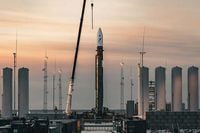The countdown has begun for Isar Aerospace’s historic launch of its Spectrum rocket from the Andøya Space Center in Norway, set for March 24, 2025. If successful, this launch will mark the first orbital launch from continental Europe, outside of Russia, establishing a new chapter in European aerospace independence.
The Spectrum rocket stands tall at 28 meters, consisting of two stages and powered by a combination of oxygen and propane as propellants. Aimed at collecting crucial data and experience, the upcoming test flight will carry no payload. Isar Aerospace’s CEO, Daniel Metzler, emphasized the importance of this mission, stating, "In today’s geopolitical climate, our first test flight is about much more than a rocket launch." This underscores a significant shift in Europe’s approach to its autonomous capabilities in the space sector.
The launch window is set between 12:30 PM and 3:30 PM CET, contingent on favorable weather conditions. The Norwegian Civil Aviation Authority has granted permission for this evolutionary step, making it clear that Europe's aspirations in space technology are materializing at a crucial time when competition in the global market is intensifying.
Currently, the European space landscape is dominated by few significant players, most notably Arianespace, which has facilitated launches from French Guiana for 45 years. However, as the demand grows for more localized and independent launch capabilities, a wave of startups including Isar Aerospace, Zero 2 Infinity, and Rocket Factory Augsburg are positioning themselves to compete against entrenched market leaders.
Industry experts, like Davide Amato from Imperial College London, highlight the implications of having local launch facilities: "The logistics of building a satellite in Europe and launching it from Europe would be simpler and cheaper," he noted. Currently, European satellite manufacturers often face expensive shipping and logistics to launch their innovations halfway across the globe.
With the current climate of uncertainty surrounding US-based providers, especially with SpaceX’s unpredictable leadership under Elon Musk, the political impetus for European entities to source launches locally is becoming increasingly critical. Isar Aerospace’s impending launch could set a precedent, paving the way for more regular flights and greater independence from foreign entities.
Further supporting this shift, Isar Aerospace has ambitious plans to place payloads up to 1,500 kilograms into various orbital inclinations of up to 30 times per year, including sun-synchronous orbits that are ideal for surveillance and weather satellites—a growing field of interest for national security initiatives.
However, the challenges remain; while this historic launch seeks to demonstrate capability, it is not without its risks. Amato shared insights, stating, "I would expect failure, which is not necessarily bad," suggesting that the testing regime could resemble Silicon Valley’s flexibly innovative approach, where rapid prototyping and adjustment are encouraged. He continued with a cautionary note, "Now, the question is, can you get to a design that survives and that’s reliable before you run out of money?" This is the crux of launching not just a rocket, but a whole new industry.
The launch site in Norway is strategically chosen for its lower air and maritime traffic, allowing for a focused approach to early-stage launches. Beyond merely being a launch point, the Andøya Space Center provides essential infrastructure, setting the stage for a hopeful and potentially thriving European launch ecosystem.
The launch of Spectrum is more than just a single event; it represents a burgeoning confidence and resolve within Europe to take control of its space ambitions. The ramifications of this flight will ripple beyond its immediate success, influencing the future trajectory of the European space industry and its capacity for independent action amid a rapidly changing geopolitical landscape.
As March 24 approaches, all eyes will be on Isar Aerospace as it embarks on this unprecedented milestone. The success of this mission could not only inspire subsequent launches but also solidify Europe’s role as a competitive player on the global stage of space exploration.




